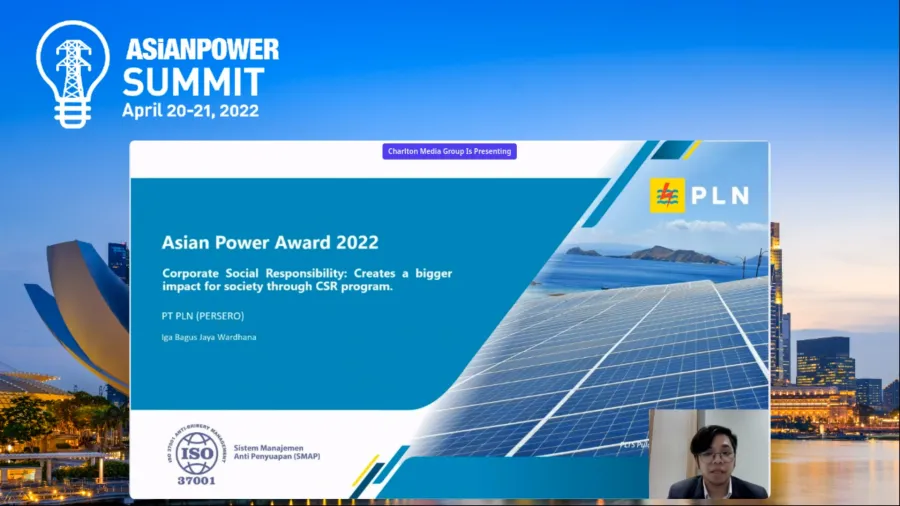
Three focus areas of Indonesia’s ‘PLN Empower’
It is the country’s main CSR program to achieve its sustainability goals by 2030.
PT Perusahaan Listrik Negara (PLN) introduced Indonesia’s main corporate social responsibility (CSR) called the PLN Empower at the Asian Power Summit, held from 20 to 21 April.
This is one of the efforts in achieving the country’s sustainable development goals (SDGs) by 2030, said Iga Bagus Jaya, Assistant Analyst for CSR Monitoring and Reporting Program, PLN. Iga explained that PLN Empower represents empowerment by and from the community to realise renewable energy in Indonesia. PLN Empower consists of 3 programs, namely Smart PLN, PLN Power, and PLN Go Green.
Smart PLN is an empowerment program to improve sustainable electricity consumption. Examples of this program are agricultural electrification, free electricity connection, economic empowerment with electrical equipment, tourist villages, induction cooker villages, PLN Women Inspiration, as well as certified vocational internships.
PLN Power is a renewable energy program with local potential that can be developed. Examples of this program are Waste Processing into Energy Sources, Electric Tubes, Biogas, Micro-hydro Biomass, and Dieselized (Gasification).
Finally, PLN Go Green is a program for handling environmental impacts, especially the impact of PLN's operations. Examples of these programs are FABA processing, coral/turtle/sea conservation, and waste banks.
"We view this… as an opportunity for PLN to continue to adapt by implementing various sustainable strategies, namely by developing the quality of products and services, increasing the competence of human resources, as well as other important aspects to achieving world-class services which of course impact on our sustainability performance,” said Iga.
In addition, PLN has two flagship programs that involve the community and have a significant impact on both the company and the community.
The first program is the Waste to Energy Program. This program aims to reduce waste from people who can use fuel in the electricity production process. Several stages included in this program are sorting, bio-drying, smoothing, drying, stamping, and printing pellets.
The second program is Fly Ash and Bottom Ash (FABA) Management. Initially, PLN implemented this program because coal-fired power plants pose a risk to electricity production. If not controlled, FABA will become waste and potentially pollute the surrounding environment. In this waste utilisation program, there are several steps taken such as waste pile, waste management, production, and utilisation.
Program implementation
"We have planned the implementation of these two programs since 2019 when PLN initially conducted research, development and surveys of all the components needed to run the program. These two programs [Waste Management into Electricity and FABA] have yielded promising results for PLN and the surrounding community. This can be seen from the achievements obtained through the implementation of these programs,” said Iga.
PLN implements the Waste to Energy program in six provinces spread throughout Indonesia. This program can manage 59,649 tons of organic and non-organic waste. In addition, PLN reduces 153 tons of CO2. The workforce absorbed through this program reaches 5,699 workers and involves 172 local community groups. On average, it can increase the income of community groups by $87,143 (IDR 1.3b) per year. This program can also reduce the company's operating costs by $871,430 (IDR 13b).
The implementation of the FABA program also yielded significant results. This program is implemented in eight provinces and spread throughout Indonesia. In addition, PLN manages 11,997 tons of FABA which is converted into economic value building materials. This activity also involved 33 micro, small, and medium enterprises and absorbed more than 1,172 workers throughout Indonesia. This program was able to reduce FABA's operational costs by $563,078 (IDR 8.4b). To win this program, PLN built 18 housing units from the FABA process product that PLN gave to people in need.
PLN runs a CSR program based on ISO 26000 where this program consists of 7 core subjects, namely corporate governance, human rights, environment, employment activities, consumer, fair operating activities, and social community contribution or community involvement development.
The CSR community is also formed to determine policies in implementing program implementation to achieve SGD and ensure PLN follows the program guidelines contained in ISO 26000 so that all programs implemented by PLN have a clear implementation basis without leaving the focus set by the government in meeting the SGD objectives. "CSR activities at PLN must also follow the applicable laws and regulations in Indonesia so that the results of the implementation and reporting of CSR planning can be accounted for," concluded Iga.













 Advertise
Advertise











